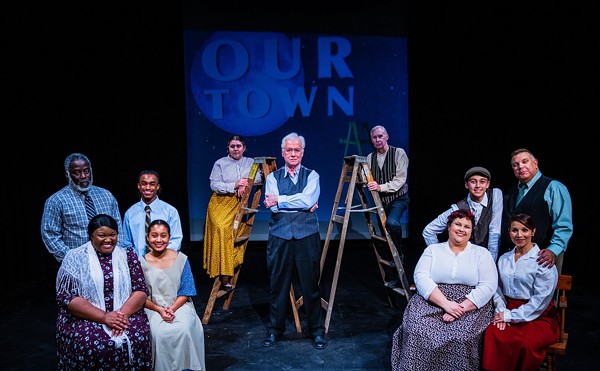Opus starts as the tale of Grace, the violist, who is auditioning for a space with the celebrated Lazara String Quartet. The group’s usual violist Dorian has disappeared, and since he was manic-depressive and well-known for erratic behavior, there’s no telling what may have happened to him. Along with Grace, we meet the remaining members of the quartet: Elliot, first violin, Alan, second violin, and Carl, cello. They’re in a hurry to find a replacement for Dorian because they’re scheduled to play a nationally televised concert at the White House, and they’ve chosen a piece — Beethoven’s Opus 131 — that’s notoriously difficult.
[dataBox]
As Grace’s relationship with the group evolves, we learn more about the musician who preceded her and the three men she wants to work with. Dorian, we’re shown in flashbacks, was the acknowledged genius of the group, the one who made the most extreme demands on the others, and who was most often right. He was also, for a while anyway, Elliot’s lover — they lived together until Elliot grew tired of the relationship. Alan is a womanizer who looks for hookups on every tour, and who seems to have pegged anxious Grace as his latest conquest. Carl is a cancer patient who’s about to find out whether the disease is in remission or has spread to other parts of his body. As for Grace, she’s a wonderful musician but a nervous and not quite honest individual: she’s still secretly tempted by news of an opening at the Pittsburgh Symphony.
On Michael Newton Brown’s elegant set — a raised mahogany platform shaped to remind us of a violin — these five characters try to create music in the midst of willfulness, petulance, sexual feelings, personal ordeals, perfectionism and mental debility. Fortunately, the music they make isn’t just an offstage rumor: repeatedly, the four main characters mime playing while gorgeous melodies come over the loudspeakers. It’s enough to make you download six string quartets to your ITunes account.
All five actors in the show turn in fine performances, but the real standout is Steve Garland, whose Dorian is an imposing figure, self-confident to the point of arrogance, desperately in love with classical music, painstaking and pained and not entirely sane. When he’s handed a priceless viola in one late scene, the devotion he shows it is almost religious in its intensity, and we can’t help but feel with him his limitless reverence.
As his sometime lover Elliot, Steven Flaa is the quartet’s Supernerd: pedantic, professorial, no-nonsense and no humor. Dan Matisa as Alan is the hardest to place of the musicians: he’s likable enough, but he never really comes across as a Don Juan, and his intentions toward Grace just aren’t evident in his actions. But Ricky Wayne is superb as emotional cellist Carl. Wayne’s Carl is capable of the most benign camaraderie and the most intimidating severity: with his wiry frame and black beard he’s the very image of the artist as temperamental visionary.
And finally, there’s the gifted Tracie Thomason as Grace, a woman who’s never entirely comfortable with others — or with herself. Thomason’s Grace is pretty much an oddball — you can easily imagine her choosing to study her music while all the other kids were out on the playing field, or necking in the woods.
Dan Lombardo’s direction is impeccable, as are Mike and Kathy Buck’s costumes — extra-casual for practices, utterly formal for performance. T. Scott Wooten’s sound design would please an exacting Brahms.
And Opus pleases consistently. At the least it’ll enlarge your respect for classical musicians. At the best it’ll win your eyes — and your ears.















